FBI Director James Comey gave a speech April 6 discussing the case against Apple and calling for not litigation but conversation that's fair, measured, and thoughtful -- and where participants are open to being wrong.


iPhone Encryption: 5 Ways It's Changed Over Time
iPhone Encryption: 5 Ways It's Changed Over Time (Click image for larger view and slideshow.)
The federal court fight between Apple and the FBI over iPhone encryption might be on hold for a while, but that doesn't mean each side isn't still trying to make it appear that its stand is the right one. The latest salvo was delivered by FBI Director James Comey.
"We are all people trying to do the right thing," Comey said April 6, concluding a speech at the Kenyon Center for the Study of American Democracy at Kenyon College. (Side note: Comey's son attends school there.)
The speech followed a globally watched drama that began with a Feb. 16 court order requiring Apple to create software to help the FBI access the contents of an encrypted iPhone. The recent activity ended March 28, when the FBI vacated the order, saying it was working with a third-party vendor that had come up with a solution.
Comey, who provided testimony before a House Judiciary hearing on the matter, gave a speech that highlighted the central friction in the argument, but also how impassioned, and biased, the arguments have become. (Such passion has arguably reduced Comey to role of "bad guy," or at least to a Tim Cook foil.)
Comey used the speech to call for a truly thoughtful conversation on the issue, which, he clarified, means both parties should be open to the idea that they may be wrong.
"Here's the thing. By 'thoughtful,' I don't mean that I'm right and you're wrong. I could be wrong about the way I assess, the way I perceive, the way I balance, the way I reason," said Comey. "But I think all productive conversations start from a place of humility: I could be wrong."

Are you prepared for a new world of enterprise mobility? Attend the Wireless & Mobility Track at Interop Las Vegas, May 2-6. Register now!
The speech seemed to -- respectfully -- put a ball in Tim Cook's court. (Or maybe President Obama's? Perhaps it's time for another round of beer on the White House lawn.)
The complete speech can be viewed on the Kenyon website. Below are five highlights from the speech that add nuance to the conversation. We also hope it continues.
1. "There are no absolutes in American life."
"There are vital constraints on law enforcement, and we must never, ever forget them. But the general principle is one we have always accepted in this country: There is no such thing as absolute privacy in America. There is no place outside the reach of judicial authority. That's a bargain that we made with ourselves 240 years ago to achieve two things we all treasure: liberty and security.
"And that bargain -- no invasion of private spaces without good reasons and appropriate oversight -- has made America a country rooted deeply in the rule of law. But it has also meant that there are no absolutes in American life."
2. "There are costs to this new world."
"Encryption brings us to a place where all of us can be entirely private … and there is a lot to love about this. I love strong encryption. It protects us in so many ways from bad people. … In many ways I think all of us like the idea of a storage space in our lives that no one can get into. A safe box that's only mine.
"But it takes us to a place -- absolute privacy -- that we have not been to before, where the balance we have long struck is fundamentally challenged and changed. And that's why we have to talk about it. That's why we have to have an adult conversation about the balance that means so much to all of us. Because no matter how you feel about it, you have to acknowledge that there are costs to this new world."
3. "If I were Apple's lawyer, I would have made the same argument."
"The danger is, if we try to guess the passcode, beyond the tenth guess, the phone may well auto-encrypt permanently -- essentially erase itself. And even if that feature went away, guessing would take us decades, because the phone is designed to have each guess require a longer period of time, as you wait to make the next guess. … So we went to court … and requested a court order that would direct Apple to do a couple things -- two things. Shut off that auto-encrypt feature on the phone, and shut off the feature that delays successively longer periods after each unsuccessful guess. … The phone could stay in Apple's possession, and the software they wrote could stay in Apple's possession.
"Apple resisted the order, which is their right. Their main argument was that the court didn't have the authority to order them to take the step of creating software … And that's a good faith, reasonable argument. …
"Obviously, the government has a different view of the law there … but it was Apple's right to make that argument, and if I were Apple's lawyer I would have made the same argument. I believe it was a reasonable argument, even if I have a different view of the law."
4. "It would be a bad thing if the conversation ended."
"Litigation is a terrible place to have any kind of discussion about a complicated policy issue. Especially one that touches on our values, on the things we care about most, on technology, on tradeoffs, and balance. So it is a good thing that the litigation is over. But it would be a bad thing if the conversation ended."
5. "On behalf of the grown-ups of the United States, I'd like to apologize."
"On behalf of the grownups of the United States, I'd like to apologize. We have not done a good job in this country, in recent years, at modeling how to have good conversations about hard things. We tend to shout talking points … without any real interest in questioning our own assumptions, our own perceptions, our own reasoning, and without an openness to being wrong, in whole or in part.
"… John Adams once wrote, to Thomas Jefferson, 'Power always thinks it has a great soul.' People, in my experience, are at their most dangerous when they are certain their cause is just and certain and that their facts are right."

About the Author(s)
You May Also Like







